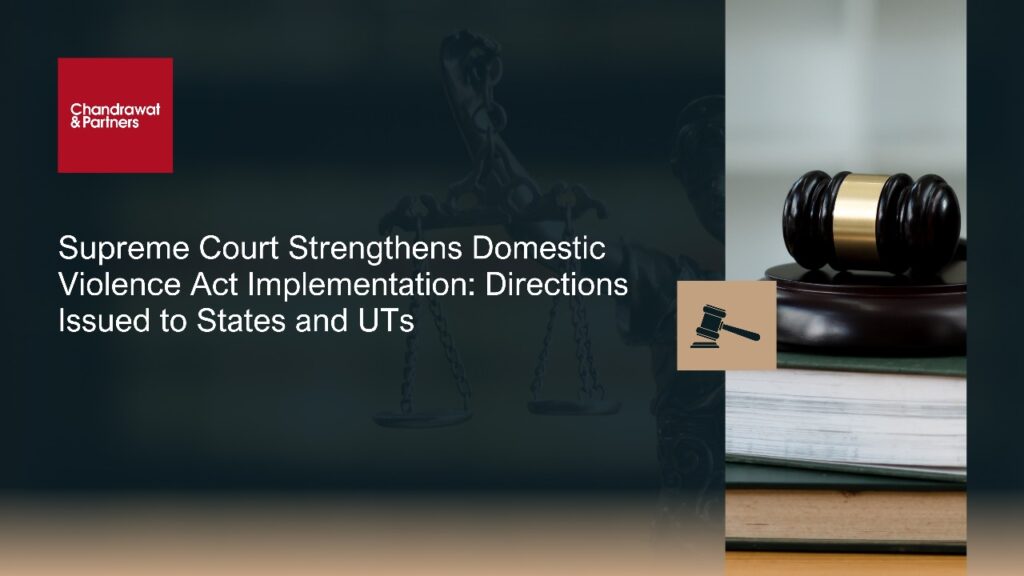Home > Recent Judgements > Supreme Court Strengthens Domestic Violence Act Implementation: Directions Issued to States and UTs
Jun 06, 2025
Supreme Court Strengthens Domestic Violence Act Implementation: Directions Issued to States and UTs
In a landmark move reinforcing the rights of women facing domestic abuse, the Supreme Court of India has issued a set of robust directives to all States and Union Territories to ensure effective implementation of the Protection of Women from Domestic Violence Act, 2005 (PWDVA). Recognizing the persistent gaps in enforcement, especially at the grassroots level, the apex court has directed urgent action to operationalize key components of the Act, with a special focus on accessibility and support services.
Key Directives by the Supreme Court
- Appointment of Protection Officers
The Court has emphasized the statutory obligation under Section 8 of the PWDVA to appoint Protection Officers in every district. These officers play a critical role in assisting victims, coordinating with the police and judiciary, and ensuring the execution of protection orders. The Court noted that many States had either failed to appoint these officers or had burdened them with multiple roles, thereby diluting their effectiveness.
- Widespread Publicity and Awareness
A major concern highlighted was the lack of awareness among women about their rights under the PWDVA. The Court directed State governments and Union Territories to initiate widespread publicity campaigns, especially in rural and semi-urban areas. These campaigns should inform women about available legal remedies, helplines, and institutional support mechanisms under the Act.
- Creation and Maintenance of Shelter Homes
The judgment reiterated the importance of shelter homes as a safe space for women fleeing abusive households. States have been asked to either create new shelter homes or strengthen existing infrastructure, ensuring they are adequately staffed, secure, and equipped to handle emergency cases of domestic violence.
- Provision of Free Legal Aid
Reinforcing the right to legal representation, the Court instructed authorities to provide free legal aid to survivors. This includes timely legal counselling, representation before Magistrate Courts, and assistance with filing protection orders, residence orders, or maintenance claims under the Act.
Context and Judicial Rationale
The Supreme Court’s directions come in the backdrop of multiple reports and petitions revealing systemic inertia in enforcing the Domestic Violence Act. Despite the legal framework being in place for nearly two decades, thousands of women still lack access to basic protection and support services. The Court noted that the failure to operationalize statutory mechanisms amounts to a denial of justice and violates the fundamental rights enshrined under Article 14 (equality before law) and Article 21 (right to life and personal liberty) of the Constitution.
Implications and the Way Forward
The judgment is expected to serve as a catalyst for overdue reforms in the implementation of domestic violence laws. If followed in letter and spirit, it can significantly improve institutional responsiveness and empower women to seek redress without fear or stigma. Moreover, it places accountability squarely on State and district administrations to deliver timely protection and support to survivors.
However, the real impact will depend on the prompt execution of these directives and the monitoring mechanisms put in place by both the judiciary and civil society. Training of Protection Officers, periodic audits of shelter homes, and legal awareness drives in vernacular languages will be essential components in translating this judicial intent into reality.
Conclusion
The Supreme Court’s intervention marks a critical reaffirmation of its commitment to uphold gender justice and ensure the meaningful enforcement of progressive legislation like the PWDVA. As implementation takes center stage, this judgment could pave the way for a more responsive and humane legal ecosystem for women trapped in cycles of violence.
For more information or queries, please email us at
enquiries@chandrawatpartners.com





